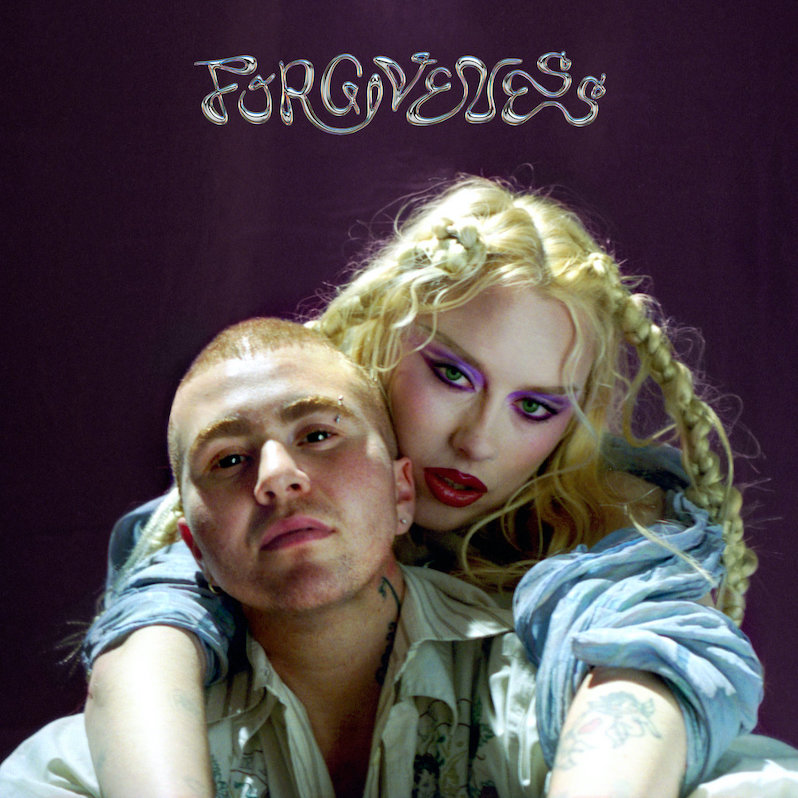Girlpool : Forgiveness

Girlpool have come a long way since their 2015 debut, Before the World Was Big. The album’s quirky, lo-fi indie tone and their trademark—the mirrored harmonizing vocals between Harmony Tividad and Avery Tucker, feels like a lifetime ago. Given Tucker’s personal journey, coming out as trans in 2017, it’s been obvious from the start that neither gender or nor vocal range has anything to do with the duo’s undeniable chemistry or gift for songwriting. On Forgiveness, they continue to evolve.
Tividad and Tucker tend to create their own style by repurposing and re-envisioning genres like dream pop, pop punk, indie, emo, and folk, then splicing them together into one cohesive album. They couldn’t have picked four better singles from Forgiveness to best represent their broad range. “Nothing Gives Me Pleasure,” “Faultline,” “Lie Love Lullaby,” and “Dragging My Life Into a Dream” all show a wide cross-section of their musical styles. The sonic palette on Forgiveness is inventive, powerful and full of emotion, hinting at a torment just underneath.
The opener, “Nothing Gives Me Pleasure,” is immediately arresting, with a series of electronic noises, beeps and buzzes that are suddenly calmed by Tividad’s soft, breathy vocal musings. It’s as strong as any album opener they’ve released, and features the first of many earworms on Forgiveness. Tucker, who has been singing an octave lower since 2019’s What Chaos Is Imaginary, addresses the struggle to find identity and face his demons on the tender song “See Me Now.” In a personal essay in 2020 about their changes, he wrote: “Transness challenges us to validate our inner truth over people’s ideas of who we are ‘supposed’ to be.” “See Me Now” brings to light the ups and downs about transitioning. “When I was young, for a girl I was tough / Now I’m figuring out how you see me now,” Tucker sings, but doubt and painful memories creep in. “I’ve got doors that open / they push on my head.” Life’s chapters, at least for Tucker, may never definitively close. But Tucker is resolved. “They ask me if I’m good for this, and I am,” he sings.
“Dragging My Life Into a Dream” returns to their indie pop roots and is a lovely example of the closeness the two share. “Would you drag your life into mine right now?” Tucker asks, pleading for the past. Injured, introspective lyrics are supported by Tividad’s and Tucker’s soft vocals and harmonizing. Percussive mood-changers also fit in well on Forgiveness. “Light up Later” (with vocals by Zsela) features a startling and pristine a cappella intro from Tucker. Openly sexual statements appear on the warped darkness of “Lie Love Lullaby.” “Country Star” and leaves lasting damage meshes a ’90s synth vibe with Tucker’s fuzzy vocals and the alarm of a distant guitar buzzes.
Girlpool’s songwriting skills are a huge draw on Forgiveness, not just for the eye-catching imagery their lyrics create but also for surprising moments of honesty. Almost halfway through the tracks, “Faultline,” begins as a childhood lullaby, but quickly turns into a confessional. Tividad drops truth bombs about how we denigrate ourselves in the name of superficiality and personal validation. In the song, she gives herself away to strangers in the meat market of a Friday night. “I hold my body like a butcher knife.” As she loses her identity, she sinks further into the earth, but all she can do is laugh about it (“I’m shaking in a sentimental trope.”) Despite being a place that’s commonly broken and disrupted, perhaps “Faultline” represents where Tividad and Tucker meet musically.
Sexual and religious undertones are frequent themes on Forgiveness, and Girlpool uses them to draw parallels to some of indie rock and pop punk’s most impactful moments. On “Junkie,” the mention of “doll parts in the graveyard” recalls Hole’s similarly named song, while a reference to Aberdeen brings to mind Kurt Cobain’s death. An understated yet seismic message about toxic relationships is revealed on “Junkie.” The tempo mimics a soft heartbeat as it dances with gentle electronic piano notes. The lyrics carry religious pop punk and emo undertones with lines like “I’m a sin for the saint you make me,” and “she’s the prayer I bury / like the cross I carry.”
The title of “Butterfly Bulletholes” sounds very much like Smashing Pumpkins’ “Bullet With Butterfly Wings” but without the grunge angst. But maybe the title brings attention to mankind’s toxic superiority. Butterflies with bullet holes is an actual thing: Naturalists used to shoot the insects with special bullets to minimize catastrophic damage to their wings, thus yielding a better museum specimen.
The heavy, guttural “Afterlife,” with its monster riff and emo-fantastical dreams, honors Tividad and Tucker’s Cocteau Twins fandom. Musically, “Afterlife” seems to honor The Cranberries’ “Zombie”. Despite being chased by demons, and with no escape even in sleep, Tividad still won’t surrender to evil. “I hide monsters in my head every day,” she breathes.
Above all, there’s an emotional connection that comes through on Forgiveness. Tividad and Tucker share an obvious closeness personally as well as musically, and with that continued growth also comes a confidence in their craft. The wide variety of songs on Forgiveness are a testament to how the group collaborates, creates, and respects each other’s work. Despite the seismic changes within the band, the members of Girlpool are still in lockstep and getting better all the time.
Label: Anti-
Year: 2022
Similar Albums:




